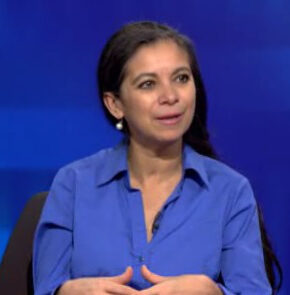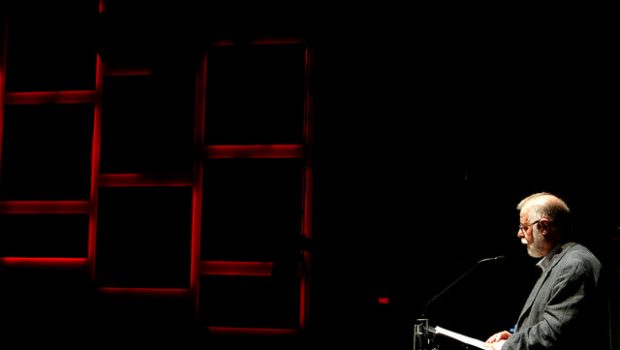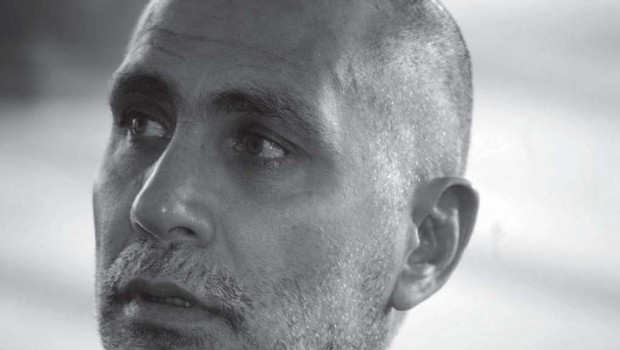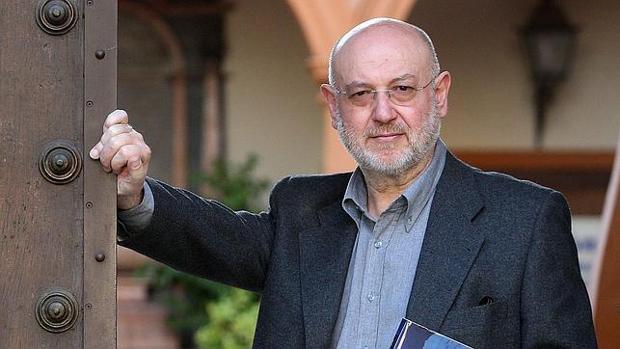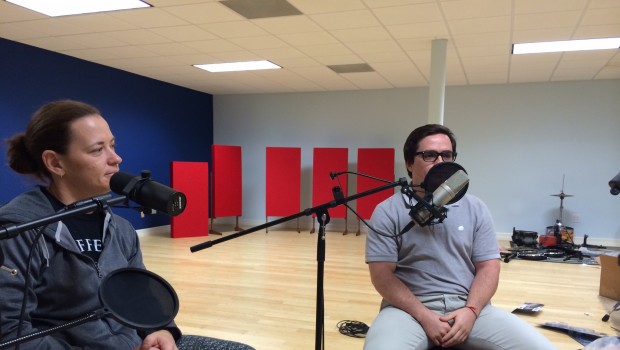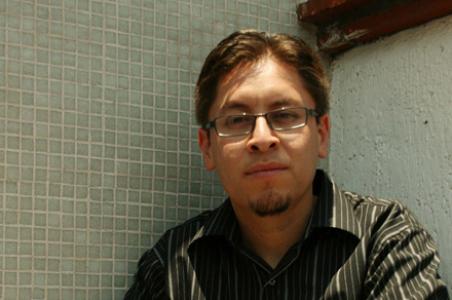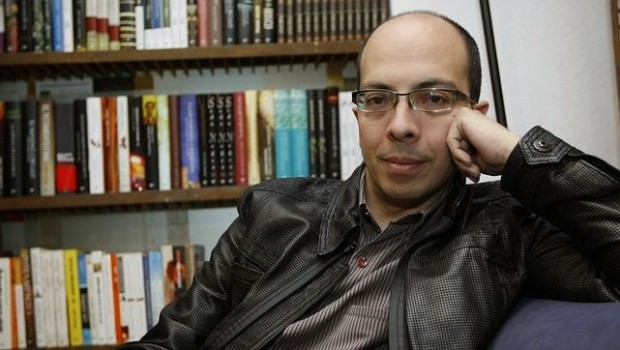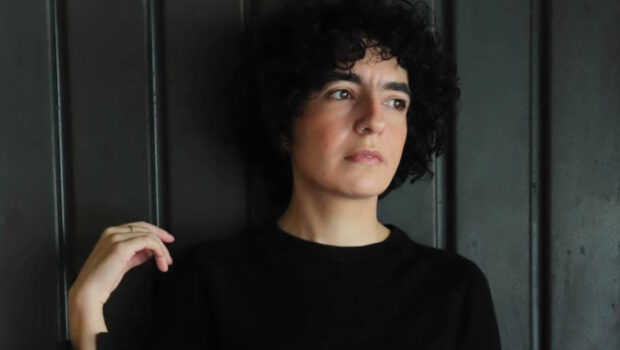Carmen Boullosa: Writing is the Supreme Adventure. Interview
Escribir es la aventura suprema
Elizabeth Cummins Munoz
The author of a broad and prolific body of work, Carmen Boullosa’s most recent publications include the poetry collection La patria insomne (2011), and the novels Las paredes hablan (2010) and El complot de los románticos (2009), winner of the Café Gijón Prize. On the occasion of her recent visit to Houston, we had the opportunity to sit down with Boullosa and talk about the process of literary creation and the magic of language.
* * *
ECM: I’d like to begin by talking about translation. I’m very interested in your involvement in the process of translating your work. Could we start with Treinta años, which was translated as Leaving Tabasco?
CB: I’ve had relationships with various translators, and they have been quite different. In the case of Treinta años, there were problems that completely defied translation. I’m not just thinking of the word pejelagartos, which doesn’t exist in English. It’s like ‘lizard’, but it’s not. Pejelagartos is peje, ‘fish’, and lagarto, ‘lizard’–something I always saw, by the way, during my childhood visits to Tabasco to see my grandmother. But there were many things that couldn’t be translated because they were local terms, and so the translator opted for an internationalization of sorts. In the end, I decided not to intervene, because it was the translator’s decision. The translator has to be a writer who can capture the atmosphere of a book. The problem isn’t a word or title, or even rhythm, but how to translate atmosphere, the music of words. Words and resonance create an atmosphere. And this is something I can’t judge, not even in the case of Treinta años.
ECM: Have you translated poetry?
CB: Very little. Every now and then, when I fall in love with a poem, I translate it. Maybe just to play with the poem a little. But it’s not a job that I have taken very seriously, as some Mexican poets have done. I don’t have the kind of generosity a translator must have. The translator needs to submit to another’s work. It’s really hard for me to read translated poetry. You can tell immediately that it isn’t the voice of the author, but that of an imposter. It shows that the rhythm is different; you can perceive the rigidity, the awkwardness, the absence of playfulness, of flexibility. You see the very personality of the translator. A translator’s personality should be invisible.
ECM: Speaking of this play and this flexibility, I’d like to talk a little about your writing process. With such a prolific body of work and these obsessions you’ve confessed to having, I wonder about your process, in terms of research and revision.
CB: First, I read, I devour written material. In other words, I become obsessed with the theme. I map out the stages of creation of a no-vel that has a precise, historical setting. I discover or find the novel, or begin the psychological and imaginary journey that is the creation of the character or situation. Then, I start reading about subject matter. That is a stage I really enjoy. I delve into the library and start snooping. When I was writing La virgen y el violín, about Sofonisba Anguissola, I’d wind up among the Africa shelves on my way to the Renaissance painting section. I would stop, open up books on the subject, and sit down to read. Thus I was able to create one of the characters, thinking it would be for another project. I started taking notes for another novel. I set the one about Sofonisba aside in order to write my novel on the black population of Mexico, because I was able to understand the grandeur of a certain moment in Africa: Gao, Timbuktu, the first great university of the world, the first one attended by women students. I read about the three great cities that fell, and how the slave trade began. All this because I was headed toward another section. That is the marvel of open stacks in libraries. The last novel I wrote, which is about Texas, was a recreation of Brownsville and Matamoros in the time of the grand thievery. I was lucky enough to have my own electronic library on my Kindle. I took lots of notes, and dreamed, and imagined. And once I had it all together, I wrote many newspaper articles about the subject in my column for El Universal while I was in Texas. It was a truly wonderful time in which I read, took notes, then sat down to write.
ECM: In your historical novels there is a strong awareness of the impossibility of accessing historical actuality. Do you feel that it is possible to represent the real through the novel?
CB: Yes, I think that literature does represent the real, even fantasy literature, and that the literary is intrinsically linked to the real in a way that is not epidermal, but very, very deep. I don’t doubt this in the least.
ECM: So, is there something that might be communicated through literature–some aspect of reality or some reality–that is not viable through historiography, or the essay, for example?
CB: I believe that literature is painting in full and in body, painting with depth. What happens is that literature articulates more than what fits into words, into the intellect. And literature is like painting, music, silence. It is capable of capturing the soul of a moment. It’s my favorite art, literature, it’s what I prefer. Now then, a painter would disagree. I believe that painting–if it were permissible to stage a competition–that literature wins the contest. It wears the golden crown, because it reproduces everything. The essay has other, rational limitations that literature doesn’t have. Life can’t be fully explained through reason. Nor is truth fully rational. Now then, the literary essay also succeeds in evoking that which doesn’t fit in words, to evoke that which is outside of explanation.
ECM: And would you say that this something that is evoked, this something that exists beyond the intellect, beyond reason, is attained through the body? Because the body is also very much present in your writing, and it seems to be an instrument for gaining knowledge.
CB: Yes, the body is an instrument for gaining knowledge in my writing, but it is also a bit like a puppet’s body, or a caricature. Moreover, it is a stage. Not a real body, but a body in the “abstract” sense.
ECM: You’ve written that the literary body devours the bodies of reality.
CB: Yes, of reality, yes.
ECM: Your work recognizes the primacy of that which is literary, but at the same time it exposes the deep structures of social injustice, patriarchy, Mexican Marianism, ecological destruction, violence in history, etc. Beyond all that, do you think that art can inspire hope?
CB: I believe that all art toys with the critique and demolition of all that surrounds it, and with the possible creation of a utopia or anti-utopia. In reality, all does is portray multiple facets of social phenomena, of human life, and of nature. Likewise, there is an art that proposes utopia or anti-utopia. It’s one of the favorite games or exercises of pop literature and film, and it’s an exercise that I like. I don’t always do it. But I do like to imagine “what would happen if…” Like in Cielos de la tierra, what would happen if a utopian community were founded that wanted to erase the memory of the past in order to make us the destroyers of Earth and man, in order to create the perfect destruction of the past, one that would destroy language? This is the premise behind Cielos de la tierra. Terrifying, right?
ECM: To write about a world in which everything is composed of air, or about a day when all the birds stop flying, or to resurrect Moctezuma in 1989, in the midst of all this fantasy, this exploration of “what would happen if?”, have you ever asked yourself, “Do I dare, or have I gone too far this time?”
CB: I’m not prudent at all, I’m quite reckless! When I’m writing, I know no fear or moderation. I think that’s my strength and might possibly also be my Achilles heel. I throw myself at and into everything. To tell you the truth, when I’m not writing, when I’m not in the middle of it, I turn around and say, “What are you thinking, writing a novel about the Battle of Lepanto?” and, “No! You are who you are. You are this person with these two hands and your own story. Write about that!” Let’s call that my prudent self, but my prudent self is not the one who writes. My writing self is something else entirely, it’s an adventurous self, a self that is daring and wants take on writing like a supreme adventure. And actually, this is what language is, because language is always a bridge reaching out toward a place where you don’t know what will be on the other side. This is the miraculous quality of language, what is embodied in literature. That is the kind of literature that interests me, which doesn’t mean that I won’t write a book some day about my own personal story. But that would be another adventure.
Autora de una obra amplia y prolífica, Carmen Boullosa cuenta entre sus publicaciones más recientes con la colección de poesía La patria insomne (2011) y las novelas Las paredes hablan (2010) y El complot de los románticos (2009), ganadora del Premio Café Gijón. Con ocasión de su reciente visita a Houston organizada por Words Without Borders, tuvimos la oportunidad de conversar con ella sobre el complejo proceso de la creación.
* * *
Elizabeth Cummins Muñoz: Quisiera empezar hablando de la traducción. Me interesa mucho tu injerencia en el proceso de traducción de tus obras. ¿Podríamos empezar hablando de Treinta años, que se tradujo con el título de Leaving Tabasco?
Carmen Boullosa: He tenido relación con diferentes traductores y han sido muy distintos. En el caso de Treinta años, tenía problemas que escapaban a la posibilidad de la traducción. Pienso no solamente en la palabra ‘pejelagartos’, que no existe en inglés. Es como lizard, pero no. Pejelagartos es peje-y-lagartos, los cuales –por cierto– siempre vi durante mi infancia en mis visitas al Tabasco de mi abuela. Pero había muchas cosas que eran intraducibles porque correspondían a términos locales y el traductor optó por cierta internacionalización. Finalmente decidí no intervenir porque ésa era una decisión del traductor. Un traductor debe ser también un escritor y tiene que capturar la atmósfera del libro. No es problema de una palabra o de un título, o incluso de un ritmo, sino de cómo se traduce la atmósfera, la música de las palabras. La resonancia y las palabras crean una atmósfera. Eso yo no lo puedo juzgar ni siquiera en el caso de Treinta años.
ECM: ¿Has traducido poesía?
CB: Muy escasamente. Cuando de pronto me enamoro de un poema, lo traduzco. Un poco por jugar con él, pero tampoco es una labor que yo haya hecho como sí –y muy seriamente– varios poetas mexicanos. Carezco de esa generosidad que debe poseer un traductor. El traductor tiene que someterse al trabajo del otro. Me cuesta muchísimo trabajo leer poesía traducida. De inmediato se nota que no es la voz del autor sino una voz impostada. El ritmo es otro y se advierte la rigidez, la torpeza, la ausencia de juego, de flexibilidad. Se nota la personalidad misma del traductor. El traductor tiene que tener una personalidad invisible.
ECM: Hablando de este juego y esta flexibilidad me gustaría hablar de tu proceso de escritura. Con una obra tan prolífica y las obsesiones que has confesado, me pregunto por tu proceso en cuanto a investigación y revisión.
CB: Primero leo, devoro material. Es decir, primero me obsesiono con el tema. Marco las fases de creación de una novela que tiene un escenario preciso, histórico. Descubro y encuentro la novela o emprendo el viaje anímico e imaginario que es la creación del personaje o la situación. Después, empiezo a leer sobre temas. Esta fase la disfruto muchísimo. Me meto en la biblioteca a husmear. Cuando escribía La virgen y el violín sobre Sofonisba Anguissola, camino a los estantes de pintura renacentista, me quedaba en el estante de África. Me detenía, abría los libros y me sentaba a leer sobre el tema. De allí pude crear un personaje pensando que sería para otro proyecto. Empecé a tomar apuntes de otra novela, comencé a dejar de lado la de Sofonisba y a trabajar en mi novela de negros en México porque entendí la grandeza de cierto momento del África: Gao, Timbuktú, la primera universidad verdaderamente universal del mundo, la primera a la que asistieron mujeres como estudiantes. Leí sobre las tres ciudades grandes que sucumben y cómo se inicia la trata de personas. Todo surgió porque yo iba camino a otra sección. Esa es la maravilla de los estantes abiertos en las bibliotecas. La novela que escribí sobre Texas fue una recreación de Brownsville y de Matamoros en el momento de la gran ladronería. Tuve la suerte de contar en mi Kindle con mi propia biblioteca electrónica. Tomé muchas notas, soñé e imaginé. Cuando tuve algo consistente, escribí muchos artículos para mi columna de El Universal mientras estaba en Texas. Fue realmente una temporada maravillosa mientras leía, tomaba notas y me sentaba a escribir.
ECM: En tu novela histórica hay una fuerte conciencia de la imposibilidad de acceder la actualidad histórica. ¿Te parece posible representar lo real a través de la novela?
CB: Yo creo que sí, que la literatura sí representa lo real, aunque sea literatura fantástica. Lo literario está intrínsecamente eslabonado con lo real de una manera no epidérmica, sino de una manera muy, muy profunda. No me cabe la menor duda de eso.
ECM: Entonces, ¿hay algo que se pueda comunicar a través de la literatura –algún aspecto de la realidad o alguna realidad– que no es viable con la historiografía o el ensayo, por ejemplo?
CB: Yo creo que la literatura es una pintura total, y con cuerpo; una pintura con profundidad. Lo que ocurre es que la literatura pronuncia más de lo que cabe en las palabras, en el intelecto. La literatura es como la pintura, la música, el silencio. Es capaz de atrapar el alma de un momento. Es mi arte predilecto: la literatura; es lo que yo prefiero. Ahora, un pintor dirá que no. Yo pienso que –si fuera permisible hacer una competencia– la literatura gana la carrera. Tiene la corona de oro porque lo reproduce todo. El ensayo tiene otras limitaciones racionales que no vemos en la literatura. En la vida no todo se explica con la razón. La verdad tampoco es totalmente racional. Ahora bien, el ensayo literario consigue también evocar lo que no cabe en las palabras: evoca lo que no cabe en la explicación racional.
ECM: ¿Dirías que eso que evoca, eso que está más allá del intelecto, de la razón, lo hace a través del cuerpo? Porque el cuerpo también está muy presente en tus escritos y parece un vehículo de conocimiento.
CB: Sí, el cuerpo es un instrumento del entendimiento en mis escritos, pero también es un poco como un cuerpo de títere, de caricatura. Asimismo, es también un escenario. No es el cuerpo real sino un cuerpo en sentido “abstracto”.
ECM: Has escrito que el cuerpo literario devora los cuerpos de la realidad.
CB: Sí, de la realidad, sí.
ECM: En tu obra se reconoce la primacía de lo literario pero, a la vez, se pone en evidencia las estructuras profundas de la injusticia social, del patriarcado, el marianismo mexicano, la destrucción ecológica, la violencia en la historia, etc. Más allá de todo esto, ¿te parece que el arte sirve para alentar la esperanza?
CB: Yo creo que todo el arte juega entre la crítica y la demolición de todo lo que hay alrededor, y la posible creación de una utopía o anti-utopía. En realidad, todo lo que hace el arte es retratar con distintas facetas el fenómeno social, el de la vida humana y el de la naturaleza. Asimismo, hay arte que propone una utopía o anti-utopía. Es uno de los juegos o ejercicios favoritos de la literatura popular y del cine, un ejercicio que a mí me gusta. No lo hago siempre. Pero me gusta imaginar “qué pasaría si…” Como en Cielos de la tierra, ¿qué pasaría si se funda una comunidad utópica y se quiere borrar la memoria del pasado para hacernos los destructores de la tierra y del hombre y para realizar la cabal destrucción del pasado que destruye el lenguaje? Ésa es la premisa que hay atrás de Cielos de la tierra. Qué horror, ¿no?
ECM: Escribir sobre un mundo donde todo está hecho de aire o sobre un día en que todos los pájaros dejan de volar, resucitar a Moctezuma en 1989, etc., en todo esto se nota el juego y la exploración del “¿qué pasaría si?” Alguna vez te has preguntado: “¿Me atrevo esta vez o es demasiado?”
CB: No tengo ninguna prudencia, ¡soy muy arrojada! Al escribir no conozco el miedo ni la temperancia. Es mi fuerte y también –posiblemente– mi talón de Aquiles. Me arrojo y me aviento a todo. La verdad, cuando no estoy escribiendo, cuando no estoy en eso, volteo y digo: “¿cómo es que te pones a escribir una novela sobre la Batalla de Lepanto?” Y “¡No! Tú eres quien eres; esta persona, con estas dos manos y tu historia personal. Escribe de eso!” Digamos que este es mi yo prudente, pero mi yo prudente no es el yo que escribe. Mi yo que escribe es otra cosa, es un yo aventurero, uno que se avienta y quiere probar la escritura como una aventura suprema. Y en realidad es que eso es el lenguaje, porque el lenguaje siempre es un puente tendido hacia donde tú no sabes qué va a haber del otro lado. Ésa es la cualidad milagrosa del lenguaje, la que se torna corpórea en la literatura. Ésa es la literatura que me interesa, lo que no quiere decir que no vaya a escribir algún día un libro sólo de historia personal. Pero esa sería otra aventura.


